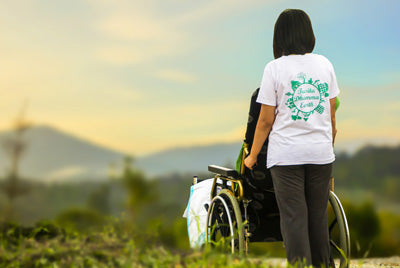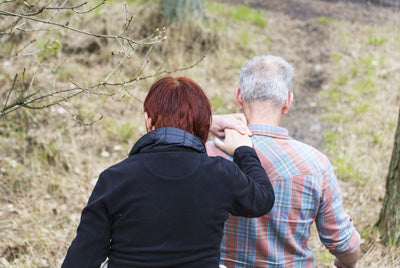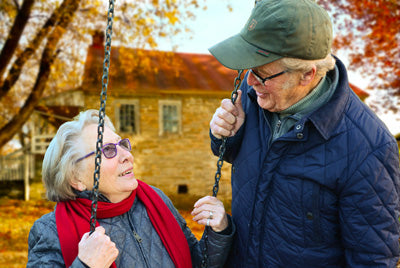by: Carey Creasey
 With over 74 million Baby Boomers and 28 million Silent Generationers left, the chances of becoming a caregiver for one of your parents or a close family member is probable. It’s normal to feel overwhelmed when you are the sole provider for a parent, family member, or friend who is suffering from memory loss, physical limitations or other issues that prevent them from fully caring for themselves.
With over 74 million Baby Boomers and 28 million Silent Generationers left, the chances of becoming a caregiver for one of your parents or a close family member is probable. It’s normal to feel overwhelmed when you are the sole provider for a parent, family member, or friend who is suffering from memory loss, physical limitations or other issues that prevent them from fully caring for themselves.
If you meet any of the criteria below, you’re more likely to suffer from caregiver stress/burnout at some point.
- Female – Women are more likely to take on the role of caregiver.
- Single – When you’re solo, most people assume you don’t have your own life and have time and energy to care for another.
- Cohabitating with the person – When you share a home with the person you care for you may feel like you don’t have your own space, a lack of privacy.
- A history of depression or anxiety – Mental health issues can be exacerbated by caregiver stress.
What can you do to alleviate the pressures of caregiver stress? Below you will find some common issues that providers struggle with and pointers on how to take care of yourself while taking care of someone else.
 As the saying goes, “Money makes the world go round” and one of the most common stressors caregivers face is financial insecurity and anxiety. You can help yourself, and the person you’re caring for, by planning for the future, and including another individual that you trust to make decisions in case of emergency. According to AARP, 92% of caregivers also provide some form of financial support, whether that be financial coordination or as a financial contributor. There are numerous ways to be properly compensated and it’s worth the time to look into all options and see if your patient qualifies for any programs that offer financial assistance.
As the saying goes, “Money makes the world go round” and one of the most common stressors caregivers face is financial insecurity and anxiety. You can help yourself, and the person you’re caring for, by planning for the future, and including another individual that you trust to make decisions in case of emergency. According to AARP, 92% of caregivers also provide some form of financial support, whether that be financial coordination or as a financial contributor. There are numerous ways to be properly compensated and it’s worth the time to look into all options and see if your patient qualifies for any programs that offer financial assistance.
Watching someone you love slowly decline is emotionally draining and the toll it takes is not just mental, but physical as well. Keeping your mental and physical health in check is key to not burning out. Eat well, exercise and participate in activities that you’re passionate about. Setting personal health goals may help you stay on track, whether it’s making a commitment to walk 15 minutes each day or meal-prepping on Sunday to ensure you have nutritionally complete lunches for the week.
Many people find solace in support groups as they navigate the world of providing care for spouses and parents. There is a wonderful online tool, Eldercare Locator, that helps people find the right support group in their area. These groups offer a chance to speak freely with others who are or have dealt with similar issues while caring for someone who is deteriorating. Having a safe space where you are supported and provided healthy coping techniques is key to successfully taking care of yourself and the dependent.
 Changes in family dynamic can be tricky to navigate as you grieve the loss of the person you once knew. Anticipatory Grief is the term used to describe grieving in advance, you are anticipating the loss, death is imminent, and you recognize that your loved one will not always be here. Huffington Post contributor, Debra Campbell, PhD, says it best, “Grief is not an emotion. Grief is a time of feeling every emotion. It’s a time of feeling blinded to everything else; seared raw by the white light of the beloved soul’s final flare.” Give yourself the permission to grieve and in time you will heal.
Changes in family dynamic can be tricky to navigate as you grieve the loss of the person you once knew. Anticipatory Grief is the term used to describe grieving in advance, you are anticipating the loss, death is imminent, and you recognize that your loved one will not always be here. Huffington Post contributor, Debra Campbell, PhD, says it best, “Grief is not an emotion. Grief is a time of feeling every emotion. It’s a time of feeling blinded to everything else; seared raw by the white light of the beloved soul’s final flare.” Give yourself the permission to grieve and in time you will heal.
Joan Lunden, former co-host of Good Morning America, became the primary caregiver for her mother, who suffered from Dementia, and her brother, who struggled with complications from Type 2 Diabetes at the same time. She has talked openly about the guilt she felt regarding her mother’s care and not residing in the same state as she slowly lost her battle with Alzheimer’s. She is a vocal advocate for caregivers and how to help your loved one by helping yourself.
This Lifestyle Health Care Blog is proudly sponsored by SKIN GUARDS.
